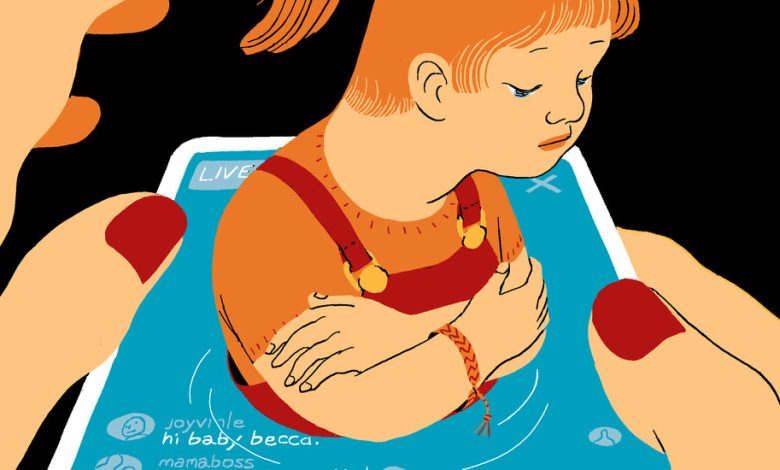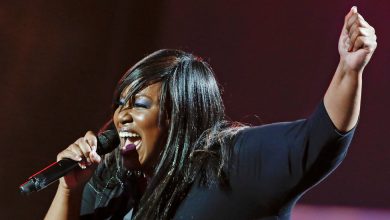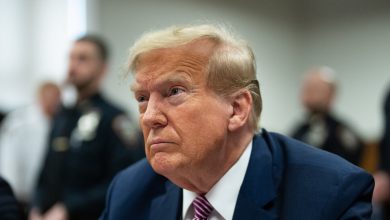Brooke Shields, Social Media and the Public’s Withering Gaze

A moment in the documentary “Pretty Baby: Brooke Shields” that epitomizes the actress’s experience of fame calls back to her time as a Princeton undergrad in the ’80s. Shields — whose image was in the public sphere from the time she was a baby, when Francesco Scavullo photographed her for an Ivory soap ad — poured her soul into a self-help book about starting college. She wrote about how lonely and difficult it was separating from her mother and how she felt so much pressure to succeed at everything.
Her publishers rewrote it.
“I kid you not, it was like, ‘I like leg warmers,’” Shields says in the two-part documentary, which premiered Monday on Hulu. “It was so inane, it had nothing to do with the gut-wrenching feeling that I had by going away to college,” she continues. “They just wanted their narrative.”
She went along with it, because that was a time in her life when she didn’t feel entitled to her own opinions. Shields describes how, during her adolescence, she would wait for her mother or another adult in her life to tell her what she thought. Those adults included the revered directors she worked with on films like 1978’s “Pretty Baby,” in which she played a child prostitute in 1917 New Orleans, and 1981’s “Endless Love,” about a doomed teenage love affair.
When Shields’s book “On Your Own” came out in 1985, the press wasn’t interested in leg warmers: The media pounced on her disclosure that she remained a virgin at 20, and the documentary shows her gamely answering a litany of rude questions from interviewers on the topic. “You never know what people are going to attack or want to know about. And I was a bit surprised because there wasn’t even a whole chapter devoted to it,” she says, trying to laugh it off in footage from an interview around that time.
“I think the hardest thing for me was really knowing who I was,” Shields says in the first few minutes of the film — and how could she develop her own identity under such a withering public gaze? She worked as a model throughout her childhood. Then as a tween she became, in her words, “the subject of so much controversy, conversation, vitriol,” when she appeared in “Pretty Baby,” which included nude scenes.
Shields is careful to paint a nuanced picture of her experience — she told The New Yorker’s Michael Schulman that “Pretty Baby” is “the most beautiful movie I’ve ever made,” and she doesn’t demonize her mother, who raised her mostly alone and struggled with alcoholism. But in the documentary she also says: “Sometimes I’m amazed I survived any of it.”
She’s an outlier in many ways — few people have been as famous as she was, so young. But she also rose to fame before the internet era, when her experience was even more unusual. Most of us who came of age before social media were able to do the hard work of identity formation without having to be aware of the opinions of strangers worldwide. We were lucky to grow up without having to think as much about being perceived and picked over by people who didn’t know us.
While the perils of young fame have been clichéd since at least Judy Garland’s day, there’s a new wave of child stars speaking up. There are celebrities in the more traditional sense, like Jennette McCurdy, the Nickelodeon actress who published the searing memoir “I’m Glad My Mom Died” in 2022. She writes candidly about her abusive mother and the loss of selfhood she experienced when she was forced into acting:
And there’s a new kind of child star: the children of social media influencers, whose lives have been monetized often before they could even speak. In March, for Teen Vogue, Fortesa Latifi interviewed some of the children of early social media influencers who are now teens and young adults, and they expressed deep unhappiness that their lives had been turned into content without their consent.
One child of influencers, Chris McCarty, now a freshman at the University of Washington, started a website called Quit Clicking Kids, and is pushing for legislation that would allow the children of influencers the right to request permanent deletion of content created by their parents from “any internet platform or network that provided compensation” to their parents for that content. In her piece, Latifi underscores the reality that even if content is deleted, these children don’t get a do-over on their childhoods outside the panopticon.
The tide does seem to be shifting in favor of privacy and consent as a new generation that has never known life without social media grows up. The 20-somethings becoming parents now know intuitively how a seemingly benign video can go viral and take on a life of its own that goes far beyond its original intention and meaning. One manifestation of that understanding, Latifi notes, is that more parent influencers are choosing to hide their children’s faces, so that they might have more private lives.
You see that Gen Z sensitivity in Brooke Shields’s daughters, Grier, 16, and Rowan, 19, who appear in the documentary’s final scenes. Shields asks them what they think about her old movies. They say they’ve never seen “Pretty Baby,” “Endless Love” or 1980’s “The Blue Lagoon” and don’t plan to. (Grier says she’s seen clips of “Pretty Baby” on TikTok, and that’s enough for her.)
The whole family agrees that “Pretty Baby” wouldn’t get made today in the same way, because times have changed, and so have our ideas about consent. Though Shields never disavows her role in the film, through modern eyes it’s impossible to understand the ’70s-era artistic justifications for showing her naked. Shields’s daughter Rowan puts it bluntly: “It’s called child pornography.” About Shields’s experience, her daughter Grier adds, sympathetically: “When you were 11, you weren’t mature enough to be making your own decisions. And other people signed off, being like: Oh no, she’s fine. You can take her top off, and she’s fine.”
Throughout the documentary, Shields takes pains to avoid labeling herself as a victim. Of her young life, she explains to her daughters: “There’s no judgment. I’m not interested in that concept.”
Her perspective resonates. It’s not necessarily about judgment, or arguing that putting children in the public eye can only end badly — I’m sure there are many counterexamples of famous children who felt they could develop their identities even as they were public figures. We hear less about them because the public tends to feed on drama and mess, which is another reason I think parents should be thoughtful about the consequences, knowing what we know today. I also think Shields’s documentary should be mandatory viewing for parents — or anyone — before they put a kid on camera.
Want More?
-
In Aeon, Clarissa Sebag-Montefiore goes long on children whose quotidian lives are monetized on social media, and the history of child labor (with the perfect headline, “Honey, I sold the kids”). She writes: “We do not yet know how exposure will affect children raised on public sites — how they’ll feel once they’re teenagers and no longer able to trade on their ‘cute’ currency; how growing up in a narcissistic system that so nakedly chases the approval of others might impact them.”
-
In 2021, Mara Wilson, who acted in “Matilda,” “Mrs. Doubtfire” and other 1990s movies, wrote for Times Opinion about what she calls “The Narrative” — one of inevitable trauma and dysfunction — surrounding child stars because of the toxicity of Hollywood. But in her experience, “I was never sexually harassed on a film set. My sexual harassment always came at the hands of the media and the public.”
She also writes that she had an escape hatch from fame: “I always had my family’s support. I knew that I had money put away for me, and it was mine. If I needed to escape the public eye, I vanished — safe at home or school.”
-
The director Sofia Coppola and the Phoenix frontman Thomas Mars tried to keep their daughter Romy off social media. Instead, the teenager went viral with a perfect TikTok that taught me the world “fiasca.”




